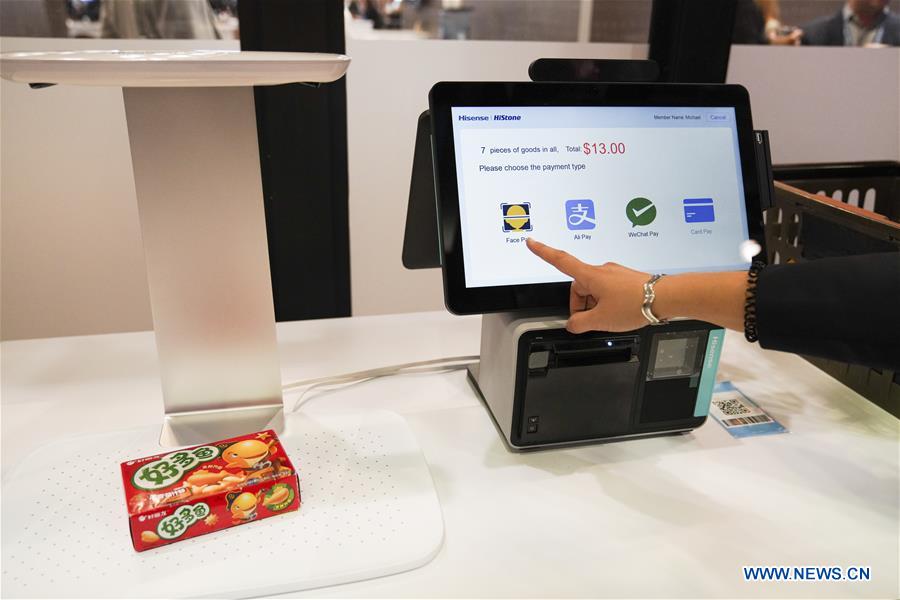Technologies bring retail revolution in China
Smart retail, partly represented by new advances such as unmanned supermarkets, mini-program shopping and virtual fitting rooms, are offering consumers a variety of personalized products and services.
E-commerce is a form of smart retail that requires a keen understanding of what consumers need. Driven by big data technology, e-commerce platforms can remember consumers’ habits. Based on this information, they can offer recommendations to them when they shop online, enabling them to directly come to the goods they are about to buy without having to search for them.

A POS (point-of-sale) kiosk by Hisense is seen at the Retail's Big Show 2020 in New York, the United States, on Jan. 12, 2020. Equipped with cutting-edge products and innovative services, a group of Chinese companies made their presence at the annual retail expo this week in New York, with ambitions to tap into the U.S. market with smart retail solutions. (Xinhua/Wang Ying)
For instance, on opening a mini-program on the instant messaging app WeChat, a consumer surnamed Zhang from Shanghai was recommended a kind of fruit tea she often bought on the app. After placing an order, the drink arrived at her doorstep half an hour later.
There are three kinds of players providing smart retail solutions - internet companies, software and service providers, and traditional retail enterprises, according to Bai Feng, Vice President and CEO for Smart Retail at BOE Technology Group Co., Ltd., an IoT company that provides intelligent interface products and professional services for information interaction and human health.
Experts believe that the retail sector can provide personalized services for consumers through behavioral analysis with the use of big data. At the same time, by using the results of the behavioral analysis to improve procurement and delivery, the retail sector can achieve flexible and efficient production and supply at much lower cost.
Smart retail could not have been realized without the help of artificial intelligence (AI) technologies such as computing vision algorithm, big data analysis, robots, and voice recognition. Many department stores and supermarkets have realized digital intelligence with the help of such technologies.
A department store in Chengdu, southwest China’s Sichuan province, has launched a smart parking app that efficiently guides vehicles to unoccupied spaces through a three-dimensional navigation system.
Technologies play a key role in realizing these scenarios, the first being the construction of internet infrastructure, including the popularization of 5G technology and the Internet of Things (IoT), said Bai. The processing ability of big data and algorithms for optimization, as well as the popularization of the hardware and software equipment are also important, he added.
Today’s smart retail is no longer just about customer flow or sales volume, but has become highly intelligent both online and offline. When it comes to physical stores, smart retail boasts precise decision-making and higher operation efficiency.
Leading Chinese retail company Suning Holdings Group has been making constant efforts to achieve digitalization of the supply chain by accelerating technology-backed transformation and increasing technological investments.
“Traditionally, it took us about three hours to distribute parcels from one warehouse, but now we spend only three to five minutes on average handling each parcel, and can handle 2,000 parcels an hour at full capacity. This optimizes inventory structure, accelerates circulation of parcels and lowers the incidence of goods being stuck,” said Jing Wei, Suning Technology Group’s vice president.
“In smart retail, the business owners do not operate based on how they feel or according to their experience,” said Lin Yuanqing, founder of Aibee, an AI company that focuses on applying digitalized and intelligent AI solutions to the physical world.
Lin further noted that intelligent technologies can help avoid inaccurate and inefficient data analysis, which means they no longer confuse salespersons with customers, but reflect the flow of customers in a more precise manner. In addition, all goods on the shelves become traceable, including their basic information and when they are sold.
An electronic price tag developed by BOE has been adopted by some supermarkets in China. By scanning the QR code on the price tag, consumers learn more about the product, and are guided to the store’s online market.
Experts pointed out that the digitalization of every link in smart retail creates great value as it helps operators understand consumers’ behavior, manage their production according to demand, and adjust the supply chain and the manufacturing process.
Photos
Copyright © 2021 People's Daily Online. All Rights Reserved.










